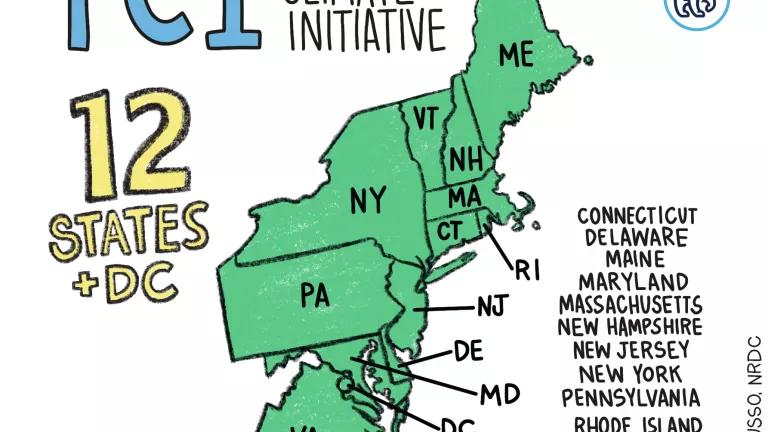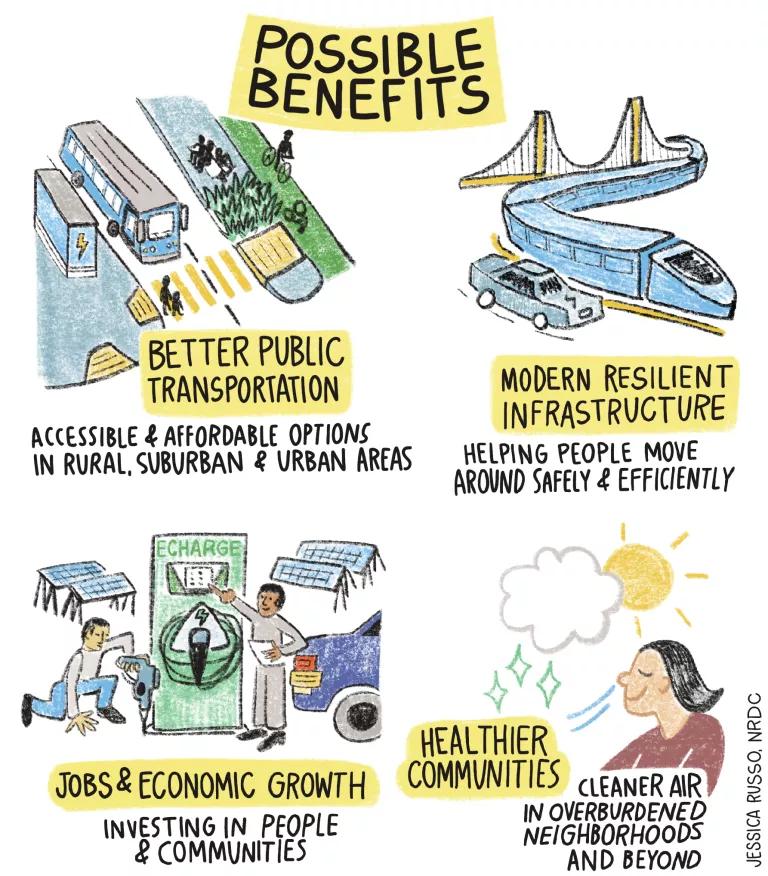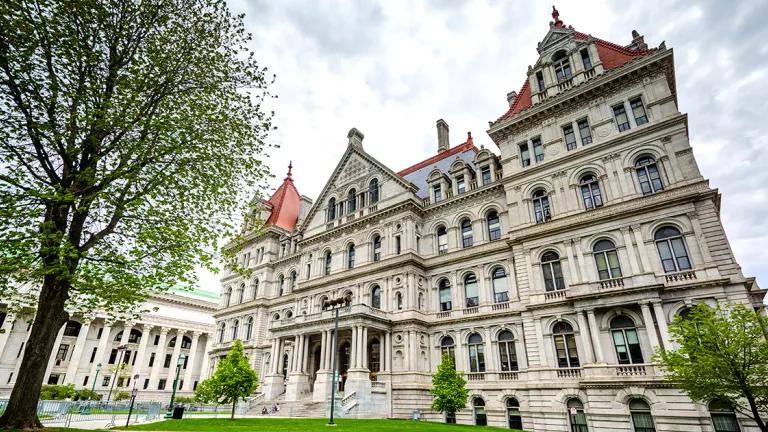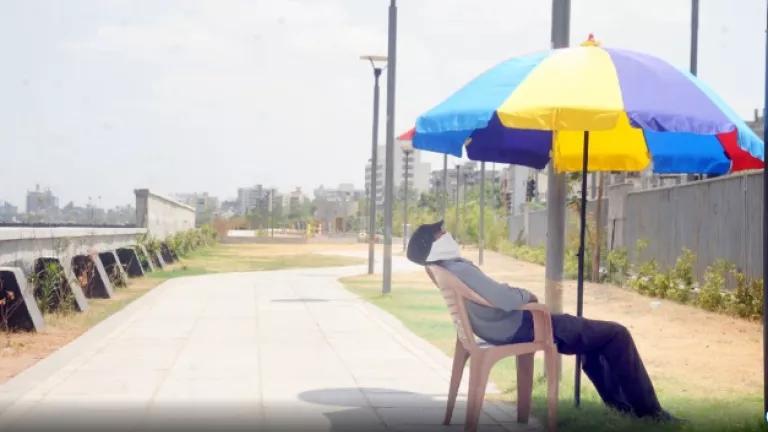A Big Step Toward Clean Transportation in the Eastern U.S.

A dozen eastern states and the city of Washington, D.C. are taking a huge step forward in making their communities more prosperous and livable as they outline a plan to transform the region’s beleaguered transportation system, in part by investing potentially $5 billion to $7 billion per year over the next decade to do so. For comparison, that’s seven to nine times more invested each year than what these states received in total to support emissions reductions and clean transportation under the 2016 Volkswagen emissions cheating settlement.
The draft Transportation and Climate Initiative (TCI) proposal released today is a bold step by Connecticut, Delaware, Maine, Maryland, Massachusetts, New Hampshire, New Jersey, New York, Pennsylvania, Rhode Island, Vermont, Virginia, and Washington, D.C. to upgrade the region’s transportation system to be more efficient, more affordable, and less polluting.
A year ago, these jurisdictions set out to develop a plan to fix the region’s transportation problems, which include mind-numbing traffic, outdated infrastructure, delayed and insufficient buses and trains, and dirty vehicles that belch clouds of exhaust while collectively emitting more climate-harming pollution than any other sector—even power plants.
Through an innovative framework that cuts pollution and invests in 21st century transportation solutions, the TCI proposal would ensure today’s broken system isn’t also the region’s future.
Release of the proposal kicks off an opportunity for the public to weigh in and is a milestone on the way to a final regional policy due out this spring. While there are still many details to work out—and ways in which the states should further improve their final policy—one thing is clear: by committing to tackle these problems, the region’s governors and the mayor of D.C. are responding to overwhelming public sentiment. A recent poll found near universal support among eastern state voters for investments in transportation improvements and strong support for the states’ proposed regional approach to do so.
The Proposed Regional Transportation Policy
The TCI policy would set the region’s first limits on transportation-sector carbon pollution; require major industrial suppliers of polluting transportation fuels, including gasoline and diesel, to pay for the pollution their products cause; and invest those payments in clean and modern transportation solutions that benefit everyone.

The proposal builds on a successful policy approach that for more than a decade has helped eastern states cut power plant pollution and invest in a clean power sector, with more renewable wind and solar energy and energy efficiency measures that lower electricity bills. The clean power policy has achieved these outcomes while simultaneously growing the economy, improving air quality, and creating thousands of new jobs.
As my colleague Jessica Russo illustrates below, and as modeling results released today and previously by the states and D.C. shows, we can expect similar outcomes by applying and adapting this successful policy approach to our transportation challenges.
Residents of urban, suburban, and rural communities will benefit from expanded, accessible and affordable public transportation; investments in electric buses, trucks, and other clean vehicles; resilient transportation infrastructure; improved pedestrian walkways; safe infrastructure for biking; and transit-accessible affordable housing.

Thus far, the states have evaluated three potential levels of policy ambition, with the strongest scenario requiring a reduction in transportation carbon pollution of 25 percent by 2032. Among its many benefits, the states project such a policy would, by the year 2032, prevent over 1,000 premature deaths and 1,300 asthma attacks per year, while providing $10 billion annually in public health benefits, including reduced medical bills, by cleaning up our air.
The states and D.C. have committed to ensure these benefits are shared equitably, including by ensuring communities disproportionately impacted by pollution and climate change and most underserved by the current transportation system are better off under the policy.
Strengthening the Final Proposal
While the draft proposal is a major step forward, there are still several questions that must be answered. These include key details around policy design, such as the need to set a minimum price on pollution and establish market protections like an “Emissions Containment Reserve” that would automatically strengthen the regional policy—and more quickly reduce transportation pollution—if the cost of doing so ends up being cheaper than expected. We’ve seen how similar elements in the region’s clean power policy design create a more robust framework, and the states should apply these lessons in the transportation sector as well.
Also important is the level of pollution reductions that the states commit to in their final policy. With transportation accounting for the largest share of climate pollution, the region’s clean transportation policy must be sufficiently bold and ambitious to ensure the scale of pollution reductions we need to address the climate crisis.
While today’s proposal includes a range of potential pollution reduction levels, it does not yet commit the states and D.C. to a final standard for transportation. Based on other analyses, we believe there are still greater opportunities to reduce transportation pollution and invest in clean solutions than the states’ draft analysis currently assumes.
In the coming weeks, NRDC and others will provide comments on the draft TCI policy proposal, including ways to strengthen it to build the clean and modern transportation system eastern state communities want and deserve.
Today, however, we recognize the states and D.C. for taking a big step forward with the release of their long-awaited proposal. The policy framework they have laid out is a sign of tangible progress that the region’s governors and the mayor of D.C. are working to ensure a brighter transportation future for their residents in the coming New Year and the years ahead.



